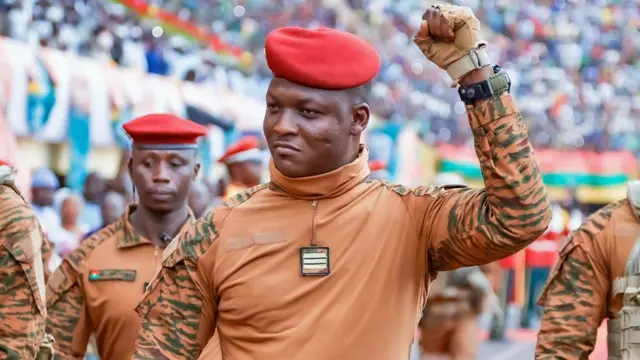Capt Ibrahim Traoré: The Rising Star of Burkina Faso
At 37, Captain Ibrahim Traoré has emerged as a prominent figure in Burkina Faso, capturing the attention of both regional and global audiences with his assertive stance on African sovereignty. After seizing control of the nation in a coup in 2022, Traoré has cultivated his image as a charismatic leader who aligns himself with anti-imperialist sentiments, drawing comparisons to notable figures such as Thomas Sankara, a former revolutionary leader revered for his integrity and vision.
Beverly Ochieng, a senior researcher at Control Risks, noted, “His messages resonate with a generation questioning long-standing relations with Western powers, particularly when it comes to the persistent poverty in resource-rich nations.” As a self-proclaimed pan-Africanist, Traoré’s rhetoric has attracted a growing number of admirers from across the continent and beyond, including political voices in places like Kenya, who see him as a beacon of hope for African empowerment.
A Shift in Alliances
In an audacious move, Traoré’s regime has shifted its allegiance from France, the country’s former colonial ruler, towards Russia, strengthening ties that include the deployment of a Russian paramilitary brigade. The regime has boldly implemented left-wing policies aimed at reaping the mineral wealth of Burkina Faso for its citizens.
Among the reforms is the establishment of a state-owned mining company, mandating foreign mining companies to transfer 15% of their operations to Burkinabé hands and provide necessary skills. These policies have implications for companies such as Nordgold, which received licensing to expand its operations under Traoré’s governance.
| Year | Percentage of Economic Growth | Extreme Poverty Rate |
|---|---|---|
| 2023 | N/A | 26.9% |
| 2024 | Projected Robust | 24.9% |
Public Perception and Social Media Impact
Traoré’s ascent has been significantly bolstered by a strong social media presence. His influence is augmented by AI-generated content featuring popular music icons, which falsely elevate his revolutionary image. According to Ochieng, a pivotal moment occurred during his address at the 2023 Russia-Africa summit, where he urged continental leaders to break free from Western “puppet strings.” This speech gained traction through extensive Russian media coverage, enhancing his pan-Africanist narrative.
Despite his popularity stemming from his bold policies and rhetoric, Traoré faces significant challenges. His administration has struggled to address a decade-long Islamist insurgency, leading to divisions that threaten regional stability. Additionally, the junta has imposed strict measures against dissent, targeting opposition voices and civil society, which has raised concerns about the regime’s commitment to democratic governance.
Changing the Political Landscape
As the youngest leader of Burkina Faso, Traoré represents a broader shift towards military governance in West Africa, with rising skepticism towards traditional democratic structures. A growing disillusionment with the political system has been documented in recent surveys, highlighting that many believe democracy has failed to bring about tangible improvements in their lives.
With the backing of militarily aligned nations like Mali and Niger, Traoré’s regime is reshaping regional alliances while challenging the long-standing influence of Western powers. His ability to connect with a young, war-weary population suggests a burgeoning appetite for a leadership style that promises change, albeit amidst concerns regarding civil liberties and political stability.
As he navigates the complexities of leadership, Traoré’s actions in Burkina Faso may pave the way for new governance models across Africa, raising questions about the future of democracy and imperialism on the continent.


